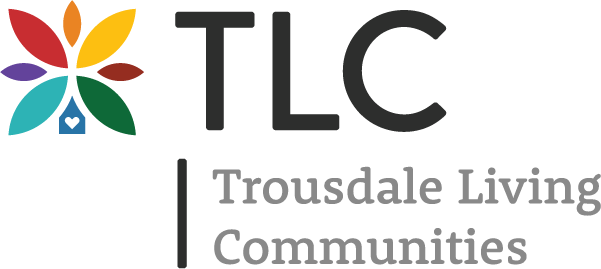As we journey through life, one of the most profound decisions we may encounter involves the well-being and care of our aging loved ones. Recognizing the time when senior living becomes a viable option and knowing what to expect is a significant undertaking. At Trousdale Living Communities, we recognize the gravity of this decision and the importance of making informed choices to ensure comfort, security and happiness for you and your family. That’s why we put together your commonly asked questions that families often have when considering senior living for their parents or relatives. Our mission is not only to provide compassionate, loving care but to also guide families through this process.
Q: When is it time to consider long-term care for a parent/relative?
While it may be difficult, this may be one of the most important decisions you make for the health and safety of you or a family member who needs support. Signs or triggers for this decision are often related to safety, injury, medical decline and or physical limitations. More subtle signs may include memory loss or mental decline that leads to isolation, forgetfulness and loss of appetite.
Recognizing the need for help can sometimes be misconstrued as surrendering one’s independence. It is our mission to help support those who rely on us for care and support while enhancing their quality of life, independence and socialization. Additionally, this approach reduces the likelihood of hospitalization.
Q: How much does senior living cost?
As with anything, the cost of senior living depends upon the care level required, the room size needed and the additional services required for the senior, based upon their level of physical and mental wellness. Different geographical locations of Trousdale Living Communities also have different pricing and service structures. Contact the facility you’re interested in, and they’ll be able to provide you with pricing based on the individual needs of your loved one.
Q: What should I look for when considering a continuing care facility?
Contemplating the cost of senior living can be a very emotional decision. Choosing a facility that helps navigate overwhelming financial and legal processes is essential to minimizing your burden.
Other things to consider:
- Location
- Staffing
- Building layout
- Level of medical staff
- Room Size
- Activities
- Amenities
- What comes at the base price, and what services are additional/optional?
- Distance from closest hospital/family doctor
- Transportation
- Cost
- Social media reviews
Read our blog post for more detail.
Q: What is a continuing care retirement community?
A continuing care retirement community (CCRC) is a retirement community that offers a range of housing options and care levels, from independent living to skilled nursing care. This allows residents to age in place and receive the level of care they need as their health changes over time.
Q: What is the difference between independent living and assisted living?
Independent living is for seniors who can live on their own but want the convenience and social opportunities of a retirement community. Assisted living, on the other hand, provides help with activities of daily living such as dressing, bathing and medication management. Some assisted living facilities come with secured memory care units, dedicated to those requiring Alzheimer’s and Dementia care.
Q: What is skilled nursing care?
Skilled nursing care is 24-hour care provided by licensed nurses for patients with medical conditions that require ongoing monitoring and treatment, such as those recovering from surgery or with chronic illnesses like pneumonia, COPD, orthopedic surgery or cardiac surgery. Dedicated programs for the care of progressive diseases, such as Parkinson’s or Alzheimer’s are also common in Skilled Nursing Facilities.
Q: What services are typically provided in a retirement community?
Retirement communities offer a variety of services, such as housekeeping, transportation, meal plans, fitness classes and social activities. Many of these services are Life Enrichment programs.
Q: What should I consider when choosing a retirement community?
Consider factors such as location, cost, level of care provided, amenities offered, and the community’s overall atmosphere and reputation. It’s also important to visit the community in person and speak with current residents to get a feel for what it’s like to live there.
Q: How much does it cost to live in a retirement community?
Costs vary depending on the level of care and services provided. Independent living is typically the least expensive, while skilled nursing care is the most expensive. According to a 2021 survey by Genworth Financial, the median monthly cost of assisted living in the United States is $4,300, while the median monthly cost of a semi-private room in a skilled nursing facility is $8,821.
Q: Do Medicare and Medicaid cover the cost of living in a retirement community?
The cost of Independent Living is mostly private pay, depending on the state. The cost of Assisted Living and Skilled Nursing Facilities can be covered by payment programs including Medicare, Medicaid, insurance and/or private pay.
Q: What is the difference between short-term and long-term care?
A skilled nursing facility provides short-term care for patients recovering from surgery or illness, as well as ongoing care for patients with chronic medical conditions. Long-term care is defined as care for seniors who require 24-hour supervision and medical care.
Q: How do I know if a retirement community is a good fit for me or my loved one?
It’s important to visit the community in person, speak with staff and residents, and ask questions to determine if it’s a good fit. Consider factors such as location, level of care provided, amenities, and overall atmosphere. You may also want to consult with a healthcare professional or financial advisor to help you make an informed decision. Oftentimes, facilities encourage you or your loved one to stay on property for a short period (respite stay) to evaluate readiness and satisfaction.
Conclusion
There comes a time when we must make decisions that impact the well-being of our aging loved ones, and recognizing when senior living is the best choice is no small task. We understand the weight of this decision and the need for guidance to ensure the comfort, security and happiness of your family. We hope this guide has provided you with valuable insights into the common questions that arise when considering senior living options for your parents or loved ones. Our commitment extends beyond providing compassionate care; we aim to be your trusted resource through this significant process.
All Your Needs. All Our Hearts.
At Trousdale Living Communities, a 501(c)3 nonprofit charitable organization, our goal is to care and provide for your loved one and embrace every resident as a person FIRST, so that you can have peace of mind that your parent or loved one is healthy and face. We are dedicated to serving the needs of our residents and patients with exceptional, compassionate and loving care. Our highly trained and experienced team of nurses, CNAs, physical therapists, medical and administrative staff provide you and your loved ones with preeminent care. It’s time to join a community of care, comfort, and compassion, a community that is consistently focused on your needs.


